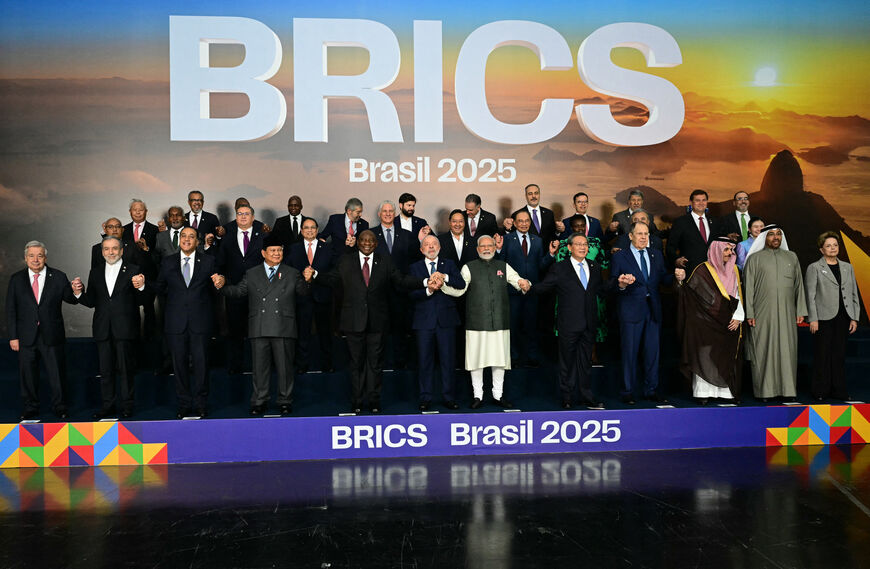Why rearming Iran is risky gambit for China — for now
Hi readers,
It’s a big week for China in the Middle East. Premier Li Qiang is making his first two-day visit to Egypt and one of China’s major clean energy companies has secured a $200 million contract with Oman.
But China also made headlines in a more controversial context, as regional and Iranian media reported this week that it may be helping Iran rebuild its military capabilities — specifically its ballistic missile program — following the recent 12-day war with Israel.
Beijing swiftly denied the reports on Wednesday. The idea of rearming Iran just two weeks after it was battered in a war with Israel carries serious risks for China. While supporting a strategic partner could offer some benefits, the timing and nature of this alleged assistance pose unnecessary liabilities for Beijing at a perilous time in US-China relations.
Let’s unpack.
Thanks for reading and subscribing!
Joyce (sign up on LinkedIn or here)
Leading this week
Two weeks after the Iran-Israel war ended on June 24, the ceasefire has largely held. But diplomacy remains stalled, and as Ben Caspit reports, Israeli Prime Minister Benjamin Netanyahu is eager for a second round. During his third visit to the White House, Netanyahu is reportedly seeking Donald Trump’s approval for further strikes.
Inside Iran, pro-reform outlets Entekhab, Ruydad 24, and Asre-Iran reported that the regime has obtained an advanced military package from China that includes long-range surveillance radars and high-end electronic warfare systems. Separately, the Middle East Eye claimed that China transferred surface-to-air missile batteries to Iran after the war in exchange for oil payments.
China quickly issued a denial via its embassy in Israel. The statement read, “China never exports weapons to countries engaged in warfare and maintains strict controls on the export of dual-use items,” adding, “China firmly opposes the proliferation of weapons of mass destruction and their delivery systems, and continuously strengthens its enforcement capabilities regarding non-proliferation.”
Let’s examine
- On one hand, China has strong reasons to support Iran, a key strategic partner. It has done so in the past — though notably not by supplying missile hardware. Instead, China has allegedly shipped chemical components used in Iran’s missile production.
- In February, CNN reported that two vessels carrying 1,000 tons of sodium perchlorate had anchored outside the Iranian port of Bandar Abbas. In June, just a week before the war, The Wall Street Journal reported that ammonium perchlorate shipments were expected to reach Iran in the coming months, potentially fueling hundreds of ballistic missiles. If true, these activities differ significantly from supplying finished radars or missile batteries.
- China previously curtailed its support for Iran’s nuclear program in the 1990s, forcing Tehran to turn to North Korea and Russia for tunnel-digging and other expertise.
Joyce’s take: Politically, China wants to ensure regime survival in Iran, and the recent war hasn’t threatened the regime internally, so there’s no need for Beijing to act urgently. More importantly, overtly aiding Iran’s military right now would be a strategic misstep. Here’s why:
- Diplomatic balancing. China has carefully maintained a low profile before, during and after the war, balancing its improving ties with Israel with trying to prevent a broader regional conflict.
- US involvement. With the US actively involved in the war, helping rearm Iran now would risk pulling China into Washington’s crosshairs, potentially jeopardizing high-stakes trade talks with the Trump administration.
- Alternative suppliers. Iran can turn to other partners — North Korea and Russia — for missile procurement. Both face fewer diplomatic repercussions than China does, especially Pyongyang.
This doesn’t mean China will completely disengage. It may still work around sanctions to buy oil from Iran or provide dual-use chemical or drone components. But that kind of support carries far less risk than shipping missile systems just 14 days after a war.
Deals and visits
- Chinese premier arrives in Cairo for two-day Egypt visit
- Oman, Chinese asset manager launch joint $200 million energy transition fund
- China denies reports of air defense systems transfer to Iran
- Iranian FM meets Chinese vice minister of foreign affairs on sidelines of BRICS summit
- UAE’s AD Ports Group signs logistics agreement with China’s Ningbo Zhoushan Port
- Chinese firms hit with latest US sanctions targeting Iranian oil trade
- UAE airline Emirates launches new daily route between Dubai, Shenzhen
- Chinese-Brazilian joint venture wins subcontract on Omani iron ore plant
- Saudi Arabia’s ACWA Power eyes China expansion
- Qatari investment delegation meets with Chinese trade delegation in Beijing
Thanks to Al-Monitor's Rosaleen Carroll for helping with this section.
Photo of the week
What we are reading
- China likely to strengthen backing for Iran as it looks to secure strategic interests (SCMP)
- Why China isn’t a bigger player in the Middle East (The Atlantic)
- China has paid a high price for its dominance in rare earths (New York Times)

